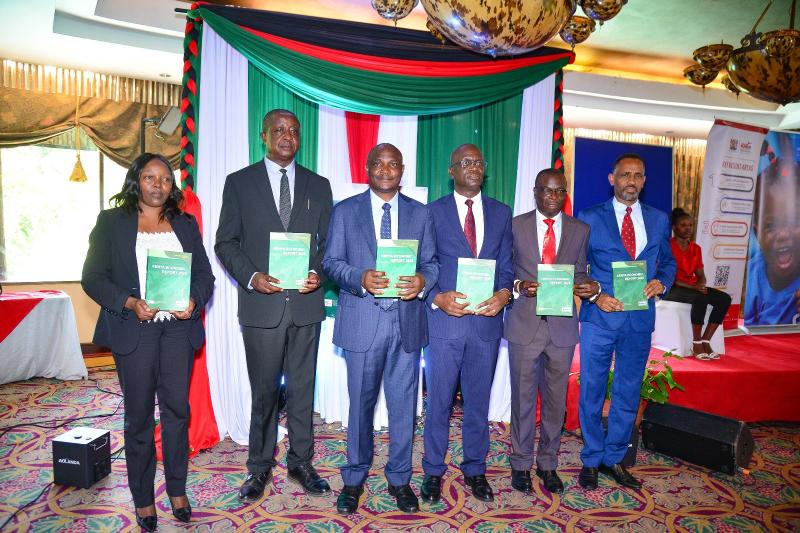Mbadi confirms Treasury deliberately influencing shilling’s value against dollar

The IMF has expressed concern over the shilling’s narrow trading range, which has remained between Sh129.22 and Sh129.24 since the start of the year, despite global trends that would have strengthened the local currency.
The Treasury has admitted that it is deliberately influencing the shilling’s value against the dollar, in a bid to cushion the economy from global shocks.
Speaking during a press briefing, Treasury Cabinet Secretary John Mbadi said the shilling could strengthen to Sh118 to the dollar if allowed to trade freely amid higher inflows of the US currency.
More To Read
- Kenya’s economic recovery not translating to quality jobs, report finds
- Kenyan shilling hits 17-month high at 128.96 against the dollar
- No layoffs for civil servants as Treasury unveils new payroll control system
- Treasury CS John Mbadi defends ballooning State House budget
- Ndindi Nyoro questions government’s decision to sell 15 per cent Safaricom stake
- Kenya Kwanza adds Sh3 trillion to national debt in three years, CBK reveals
“By the way, the stability of the shilling has a basis. I was even saying, if it [the shilling] is just allowed free fall, the shilling would even trade at 118 to the dollar,” Mbadi said on Tuesday, suggesting a State preference for a weaker shilling.
He explained that the shilling’s stability is supported by improving macroeconomic fundamentals, including higher exports, tourism receipts and diaspora remittances.
“Because our current account balance has been improving. Our exports are doing better,” he said.
The IMF has expressed concern over the shilling’s narrow trading range, which has remained between Sh129.22 and Sh129.24 since the start of the year, despite global trends that would have strengthened the local currency.
The Fund described the shilling as “too stable”, noting its weakening against other major currencies, including the euro and British pound, which have fallen 12 per cent and 6.1 per cent, respectively.
The Central Bank of Kenya (CBK) maintains that Kenya has a flexible exchange rate policy and intervenes only to smooth volatility.
Export earnings fell 3.06 per cent to Sh554 billion in the six months to June, while tourism receipts are projected between Sh560 billion and Sh650 billion this year, up from Sh452.2 billion in 2024. Remittances rose 5.88 per cent to $2.519 billion in the same period, with foreign exchange reserves standing at about $12.1 billion (Sh1.56 trillion).
The shilling’s stability has also been reinforced by a 2023 deal to purchase fuel on credit from three state-owned Gulf companies, allowing Kenya to accumulate dollars gradually rather than paying around $500 million per month for imports.
David Ndii, chairperson of the Presidential Council of Economic Advisers, said the CBK has alternated between setting interest rates and managing the exchange rate to control imported inflation.
“We say our [monetary] instrument is interest rates, but when you try to uncover it, it flips between the two [interest rate and exchange rate]. Sometimes we use interest rates and sometimes we use the exchange rate, and that’s what I call common sense,” he said at the NCBA Economic Forum last week.
He added that Kenya, unlike developed economies, cannot rely solely on interest rates as a monetary policy tool because the economy is small and highly exposed to external shocks, which limits the transmission of interest rate decisions.
Under IMF policy orthodoxy, the exchange rate is expected to act as a shock absorber, adjusting naturally to external pressures. A freely floating shilling would make Kenyan goods cheaper abroad when exports slow, helping exporters recover.
However, for frontier economies like Kenya, which carry significant foreign debt, allowing the exchange rate to adjust freely increases import costs and debt servicing obligations, since much borrowing is denominated in foreign currency.
Mbadi also said the government’s failure to proactively manage its Eurobond liabilities contributed to the shilling’s sharp weakening.
“After managing the Eurobond of 2024, this year, we thought quickly and managed the 2027 Eurobond when the markets were open,” he said.
Top Stories Today










































